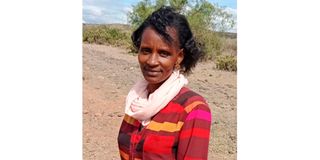How Covid-19 turned school owner into published author

When schools were shut down to curb the spread of Covid-19, Purity Makena, who runs a school, took to writing, going on to publish four books.
What you need to know:
- Three of the books focus on educative teaching for young readers, covering Kenya’s history and the nation’s notable political figures.
- The books are titled Fathers of our Nation, Spirit and Flag of our Nation and Patriotic Leaders (featuring the late Wangari Maathai and John Michuki).
When the first case of Covid-19 was announced in the country early 2020, followed by closure of schools and other measures to restrict the spread of the virus, Purity Makena, 43, was devastated. She ran a school, Bethany Hills Kindergarten, located in Embakasi, Nairobi County. The directive immediately cut short her source of income and put a stop any plans she had that involved money.
Since there was no indication when schools would be reopened, she knew that she had to think fast and look for another source of income.
“The positive thing that came out of that period is that it ignited my interest in writing, specifically becoming a published author,” she says.
Although she began writing after completing high school, the business management and accounts graduate did not realise her dream of becoming a published author until recently. She is a self-published author with four children titles to her name.
Three of the books focus on educative teaching for young readers, covering Kenya’s history and the nation’s notable political figures. She says the reason she chose children’s genre, especially stories that touch on historical facts and personalities, had to do with non-factual information that children often consume, believing it to be fact.
“Being a parent too, I realised there is a lot that children don’t know, and that what they do know is picked from non-school environments, and may be skewed.”
Another reason she chose this genre was to prepare the children to be agents of positive change, and be inspired by the great people they read about, and believe that they can rise from obscurity to be the leaders of tomorrow, just like the hero or heroine characters in the stories.
The books are titled Fathers of our Nation, Spirit and Flag of our Nation and Patriotic Leaders (featuring the late Wangari Maathai and John Michuki, for instance). The first three target young readers between the seven and 12 years, while the fourth book, and Vinedresser, is a devotion book that can be read by children from the age 10 and above.
What she realised the hard way is that when you are own publisher, you are also your own marketer, unlike working with established publishing houses that take over the publishing stage from manuscript stage, even doing the marketing after publication.
“My husband is in the printing business, and so does the publishing. The hard part is marketing. If you’re known in the literary circles, your name does the selling, but if you’re a first time author, it is very difficult for you to sell,” she says.
To market her books, she extensively uses social media, as well as her social networks such as church and friends. From her experience, it is hard to survive on income from publishing alone in Kenya. She publishes limited copies at a time to avoid incurring costs especially if the stock is slow moving. She advices budding writers to have other jobs that provide steady income, and do writing as a side job that earn you passive income, rather than plunging into full time writing.
“I take writing seriously, but it can be time consuming and less rewarding in Kenya than elsewhere where writers are taken seriously. It is advisable to write alongside your normal job than looking to survive on your craft alone,” she says, pointing out that her main source of income is her school.
Another sobering experience she had is with the established publishing houses. They prefer to publish works of known writers and are hesitant to take on first-time writers.
“It is a gamble they are unwilling to take since they are not assured that the book will sell. Also, they would rather publish academic-oriented content as they have a ready market in learning institutions,” she says.
This, she observes, is what motivates budding authors to take the costly path of self-publishing. The drawback to self-publishing locally, she adds, is the high cost of publishing and a lack of a ready consumer market.
But it is worth it
Her advice to such authors is to explore an agreement with bookshops where the latter takes a certain percentage from every copy sold.
Self-published authors in the country who have been successful in the venture include Ng’ang’a Mbugua, an award-winning author.
Despite the challenges, Purity intends to keep publishing children’s books, buoyed by a vision of a generation of informed children who are positively engaged in a reading culture. Through writing, she says, she is advocating for a society without ethnic barriers and a generation that is proud of their nation.
Writing in the pipeline include a collection of poems, general interest short stories and humorous articles.





